Classicist Richard Cassaro is a specialist on ancient religions and secret societies. His new book, Written In Stone, reveals never-before-seen visual evidence of a “secret code” hidden in plain view in the architectural facades of the world’s most famous Gothic cathedrals. He says the code conveys an ancient message to posterity which was fully intended by the Freemasons who scholars say built these sacred structures. For a powerful preview, visit www.DeeperTruth.com and download his illuminating PDF Report: Breaking The Cathedral Code, Freemasonry’s Triptych Secret Revealed. Also, visit his Sacred Science blog at www.RichardCassaro.com
An unprecedented new archaeological discovery has been made that ties the world’s ancient pyramid-building civilizations together and shows they all practiced the same advanced "Universal Religion."
The discovery, on the surface, is a seemingly simple one: it is the discovery of a key architectural parallel they all shared, and which is still visible in the ruins of their temples. We can see this parallel in the photo below. Note how the ancient Egyptians, Mayans, and Indonesians—ancient pyramid-building cultures that scholars claim were not connected—all built parallel-looking "Triptych" temples:
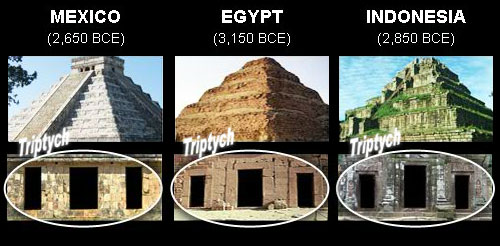
The pyramid-cultures all built "Triptych" three-door temples, with the door in the middle wider and taller than the two flanking it.
As we can see, the facade of each temple has the same unmistakable three-door pattern. Astonishingly, the universality of this architectural phenomenon has yet to be noted by archaeologists, and as such I have chosen the term "Triptych" to describe it, due to its similarity to the Triptychs painted by many Renaissance painters (many of whom, we shall find later, were aware of these Triptychs and their meaning).
These ancient Triptych temples, far from being an isolated phenomenon, occur in just about every ancient culture across the world. And they occur multiple times in each culture. Note the Mayan Triptych temples visible below:
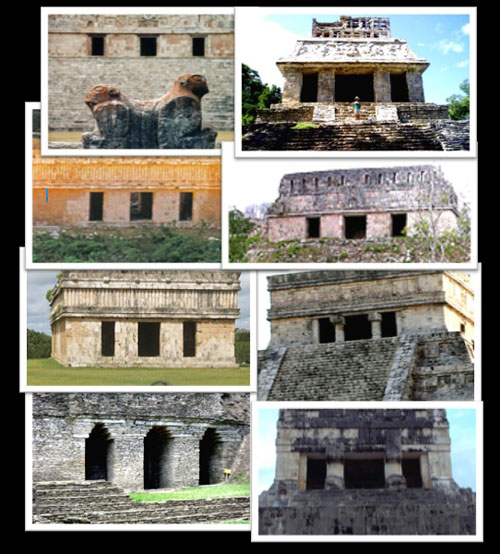
Eight Mayan Triptych temples from various cities in the Yucatan Peninsula.
The abundant occurrence of the Triptych across the ancient world is not a random coincidence. The Triptych represents more than merely an architectural element; the Triptych is the chief symbol of an advanced Universal Religion that was once shared globally in Antiquity, mainly by the pyramid cultures. The discovery of the Triptych provides, for the first time, conclusive evidence that ancient cultures worldwide shared the same spiritual beliefs. It also indicates that these cultures did not evolve independently, but were probably descended from the same more remote parent source.
The Universal Religion symbolized by the Triptych was banned in the West 2,000 years ago by the Catholic Church, but nonetheless it has continued into modern times, surviving in the beliefs of Secret Societies and their art and architecture. Look, for example, at the headquarters of the Freemasons, the Skull & Bones, the Shriners and the Knights of Pythias. Each building’s facade depicts an unmistakable Triptych pattern:

The Triptych pattern is visible on the facades of the most famous Secret Society headquarters.
The Universal Religion shared by the ancients and hidden in these Secret Society Triptychs is a complex and detailed spiritual belief system. Its tenets have been known throughout recent history by philosophers, poets, theologians, astronomers, alchemists and occultist—all of whom have been initiated into its wisdom.
The Universal Religion teaches that:
– Deep down each one of us is an eternal spiritual "soul"
– This soul is our real true immortal "Self"
– This Self is actually a divine "god" or deity with overreaching powers
The problem is, we have amnesia of our immortal godhood Self (capital S) because it is covered up by our mortal animal bodily self (lowercase s) while we live our lives on earth.
You don’t have a soul. You are a soul. You have a body." —C.S. Lewis
“Man is a god in the body of an animal according to the pronouncement of ancient philosophy…” [1] Dr. Alvin Boyd Kuhn
“A man is a god in ruins. [2] ” —Ralph Waldo Emerson
By following a careful set of instructions—encoded in the Triptych—we can transcend our body and see our real god Self within. This has long been the goal of alchemists, occultists, spiritualists and philosophers, and it is achieved by an age-old spiritual practice known as "Awakening Our Third Eye," with the Third Eye being a vestigial organ of spiritual illumination that lies hidden in the human forehead. Whereas the two eyes see outward at material things, the single Third Eye sees inward at the inner soul.
As it turns out, this too has been encoded into buildings that contain a Triptych. As we shall see in a moment, the Third Eye is symbolized by the center door of the Triptych:
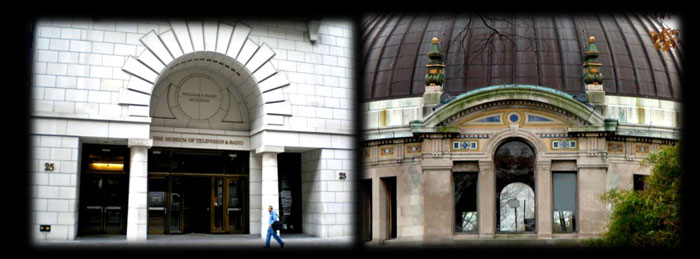
Left: Triptych entrance with luminous Third Eye above the center door, The Museum of Television & Radio in New York City. Right: Triptych pattern with Third Eye above the center door on a dome of a key building of the Bronx Zoo in New York City.
The Third Eye is well-known in esoteric circles and has been variously described throughout history as the “Divine Eye," "All Seeing Eye," “Mind’s Eye,” “Eye of the Soul,” and “Inner Eye." While the name for it differs, what remains constant throughout the esoteric doctrines is that the Third Eye is not a metaphor, symbol, or analogy. It is affirmed to be a real, physical part of the body able to strengthen or atrophy as much as any other muscle; by exercising it, one slowly but steadily increases their awareness of their natural spiritual powers.
Single “Eye” and "Third Eye" portraits stretch back thousands of years and appear again and again in myths, sculptures, engravings, and paintings in ancient pre-Christian cultures across the world. In fact, the further back in time we look, the more we see the Third Eye in art, architecture, literature and poetry.

Cyclopes, Roman Mosaic, c. 450 AD
The Greek Philosopher Plato called the Third Eye the “Eye of the Soul”:
“…I quite admit the difficulty of believing that in every man there is an Eye of the soul which…is far more precious than ten thousand bodily eyes, for by it alone is truth seen.”
“The Eye of the soul, which is blinded and buried by other studies, is alone naturally adapted to be resuscitated and excited by the mathematical disciplines.[3]
Though banned in the West by the Church, something we’ll touch upon in just a moment, the Third Eye continued to flourish in the East unadulterated. Readers familiar with Eastern religions will recall the Third Eye as having a long history in India, China, and Southeast Asia, where the religious traditions of Hinduism, Buddhism and Taoism hold sway. Known as the “urna” or “trinetra,” it is often marked by a dot in the middle of the forehead, above and between the eyes:
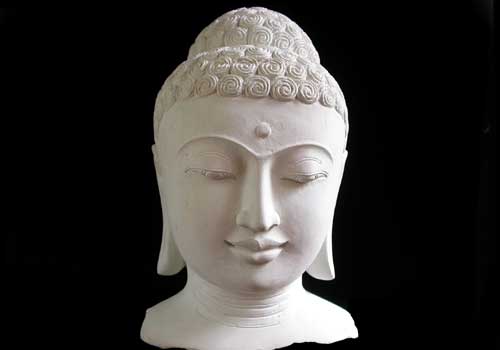
The Third Eye is symbolized in Eastern spiritual systems by the single dot on the forehead.
The image of a single Eye—the Third Eye—is common to Western “Secret Societies " like the Shriners, Knights of Pythias, and Odd Fellows. A single Eye is one of the supreme and most sacred emblems in Freemasonry. It is usually drawn in the center of a portrait, as shown in the Masonic “Tracing Board” below:

Third Degree Tracing Board in Freemasonry.
Freemasons today—who no longer understand their Order’s Third Eye secret, it having been "lost" in the mid 1800s, as we shall see—refer to this single Eye as the "All Seeing Eye" of God, which God they believe is the Hebrew Yahweh of the Bible. But a vast amount of evidence proves that the "Eye of God" is not the symbol’s authentic and original meaning; instead the All Seeing Eye signifies the Third Eye hidden in the human forehead. The Tracing Board shown above, as well as the entire system of Freemasonry, was designed to teach initiates how to awaken it.
Here’s how it works: Our bodies are perfectly symmetrical from side-to-side, made of two equal and opposing halves—a right-side half and a left-side half. We all have two hands, two arms, two legs, two hands, two feet, two shoulders, two eyes, two ears, and so on. According to the Universal Religion of the ancients, our right-side half is solar (and male) and our left-side half is lunar (and female).
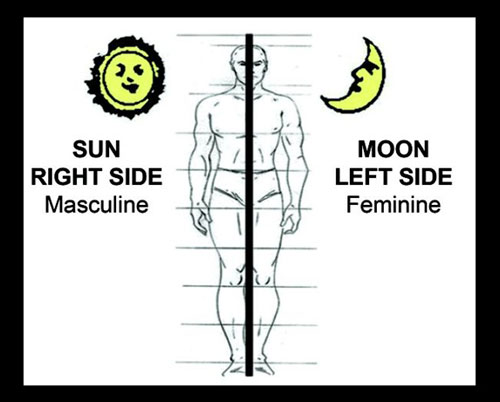
Note how the right-hand pillar on the Tracing Board, which Masons call "Jachin," is capped by sun. The left-hand pillar, which Masons call "Boaz," is capped by the moon. In many artistic, architectural, and esoteric portraits, friezes and masterpieces, the sun always appears on the right, associated with the male; the moon always appears on the left, associated with the female:
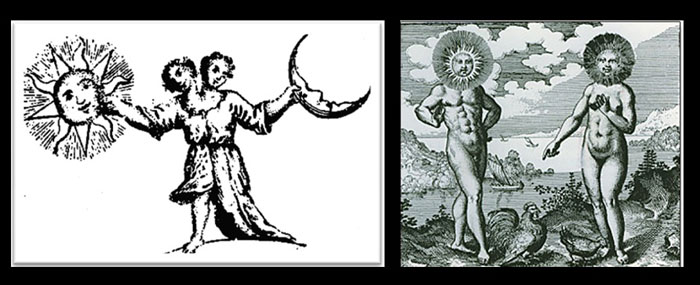
Left: So-called "Christian Androgynes" showing a male holding the sun at right and female holding the moon at left, 17th & 18th centuries. Right: An engraving from Michael Maier’s alchemical text, Atalanta fugiens, 1618, showing a male with solar head on right and female with lunar head at left.
"…the Sun represents the right half of the body and the Moon the left half … [4]
—Harry Houdini
“In ancient times men fought with their right arms and defended the vital centers with their left arms…The right half of the body was regarded…as offensive and the left half defensive…the right side of the body was considered masculine and the left side feminine. [5] ”
— Manly Hall
This duality of opposites present in the human body is actually a microcosm of the duality of opposites present in the entire universe. The sun and moon, for example, are perfect opposites.
-
The SUN stands for DAY—the MOON stands for NIGHT.
-
In the DAY it’s HOT and LIGHT—at NIGHT it’s COLD and DARK.
-
In the DAY things are DRY—at NIGHT things are MOIST.
-
The HOT DAY means LIFE or GOOD. The COLD NIGHT means DEATH or EVIL.
The sun and the moon are simply one of the most prominent examples, and this "pairs of opposites" wisdom forms the "lost key" to all the Mystery school teachings in history. Because man lives inside the universe and not apart from it, we too are composed of these same pairs of opposites—“as above, so below,” says the famous Emerald Tablet. The key is not just to understand this sun/moon duality of the human body. The key is to "unify" or "balance" the twin opposing sides and thus "transcend" the bodily duality. It’s precisely the Third Eye’s awakening.
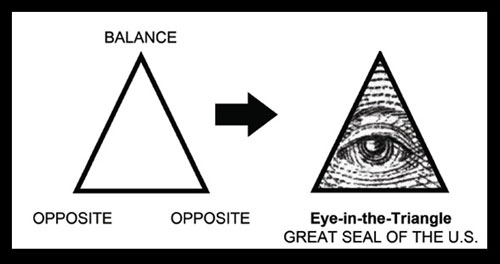
Western mystics symbolized this additional concept for centuries by drawing an eye inside the Triangle, that symbol of the awakened Mind’s Eye. Whereas the two eyes see outward at material things, the single Eye sees inward at the spiritual soul.
"Who looks outside dreams; who looks inside awakens." —Carl Jung
More than a handful of authors and researchers have set forth the thesis that Freemasonry’s All Seeing Eye signifies man and woman’s Third Eye, available for us to use. In his 1918 book, The Wonders of the Human Body, Dr. George Washington Carey tells us:
“…the All-seeing eye…This is the eye of freemasonry, the third eye. While I am credibly formed that few Masons understand their own symbols, the fact remains that they use them… [6]
Famous American Author and Freemason Mark Twain, writing in 1899, referred to the All Seeing Eye not as the Eye of some distant heavenly deity or “old man upstairs,” but as a tangible gift that any person can use:
“The common eye sees only the outside of things, and judges by that, but the ‘all seeing eye’ pierces through, and reads the heart and the soul, finding there capacities which the outside didn’t indicate or promise, and which the other kind couldn’t detect. [7]
In her 2006 book, Eden, author of the esoteric, Dr. Joye Jeffries Pugh, explains:
“The Order of Freemasonry acknowledges the ‘All Seeing Eye’ as the Eye of Great Wisdom.’ This ‘Great Wisdom’ is said to offer those who seek the sacred mysteries an understanding of illumination, inner vision, and intuitive knowledge. Contact with this great wisdom occurs through the ‘Third Eye’ (pineal gland) located inside the forehead. [8]
The Founding Fathers, Freemasons themselves, were not ignorant of the meaning and symbolism of the eye inside the Triangle. They even sketched the single Eye inside a triangle (tri = three) and placed it atop a truncated pyramid—reminiscent of the ancient pyramids and pyramidal structures whose ruins lay scattered across the globe:

The Great Seal of the United States depicts the Third Eye in a triangle at the pyramid’s unfinished apex.
Did the Founding Fathers know, through their affiliation with Freemasonry, that the world’s ancient pyramid cultures all practiced the Third Eye religion?
In their well-researched book, The Uncommon Vision of Sergei Konenkov, 1874-1971, published by Rutgers University Press in 2000, scholars John Bowlt, Wendy Salmond, and Marie Turbow explain:
"The Great Pyramid is a central occult symbol that is often depicted with the “all-seeing-eye” or “third eye” inside it. In this form it is the symbol of mystical Freemasonry. [9]
In her fascinating 1924 book, Mystic Americanism, the obscure American author Grace Morey explained:
"The All-Seeing Eye…also emblematic of the…third eye of the human being…has been found amid the ruins of every civilization upon the globe, thereby attesting the fact of a universal religion over all the earth at some remote period. As we now restore this universal religion, we set the All-Seeing eye upon the pyramid. [10]
So the secret of the Triptych and the ancient Universal Religion which it symbolizes is that by balancing our bodily duality we can awaken our Third Eye and see the "god" at the center of ourselves, which is who we really are. This wisdom has been hidden from the masses, yet given to initiates of Secret Societies like the Freemasons, whose esoteric drawings depict a single centered Eye symbol that is always flanked by the sun and the moon:

Masonic regalia. The Third Eye symbol is always placed in the middle, balanced between sun and moon.
This formula for awakening the Third Eye is hidden in plain sight in the Triptych entrances of countless buildings constructed throughout the West during the past 2,000 years. We’ve already seen two example of this (The Museum of Television & Radio and The Bronx Zoo). Here is another example:
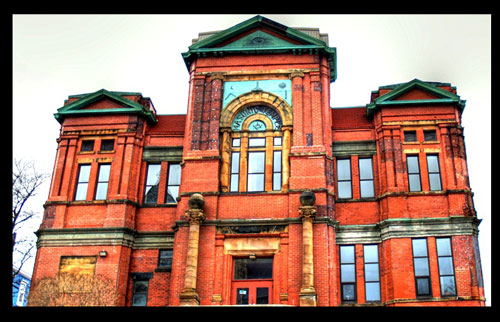
Masonic Temple, Newfoundland and Labrador. Note the single Eye inside the middle triangle.
The facade of Rockefeller Center in New York City, built in the early 1900s, represents one of the most powerful hidden-in-plain-sight Triptychs created in modern history:
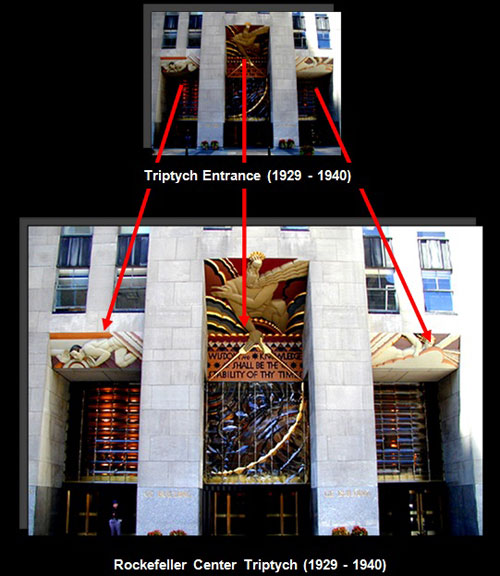
Male on the right, female on the left. The god in the center door of the Triptych is you, your inner Self. Note the Masonic compass in the god’s hands.
Thus, according to the Universal Religion of the Triptych, we humans are inherently divine, but in some sense we have fallen from our heavenly home into a human form. The divine soul still exists within us—indeed, it is our true Self according to the Universal Religion—and through the use of the Third Eye we can reawaken our inner godhood.
This is a gross oversimplification of the religion, but I cannot do it justice in such a short piece: more information and a thorough reconstruction and explanation of this religion is present in my book, Written In Stone, which also includes research related to the religion, including its origins and presences across the globe.
Remnants of the Universal Religion survive best in the East, predictably, where many of its tenets can still be seen to play a part in Eastern spiritualism. The Third Eye still exists in—and is indeed still a major part of—the Hindu religion, for example, though distorted by the passing of time. The Universal Religion, however, fared far worse in the West, where the rise of Christianity led to direct conflict with the idea of personal godhood.
This "missing history of the Triptych" in the West seems to be precisely the message that great artists like Leonardo da Vinci intended to convey esoterically in portraits like The Last Supper, which show how Jesus (i.e., the religion of Christianity) has "covered over" the Triptych religion of ages past.

Was da Vinci telling us in code that Jesus’ religion has covered up the ancient Universal Religion of the Triptych? Or is he saying that Jesus the “man” found his “god” (Christos) within by using the Triptych religion? Or is it both?
The reasons and interplay that influence the conflict between the ancient Universal Religion and the early Church are myriad and out of the scope of this article; suffice it to say that the ancient Universal Religion was perceived as blasphemous in the Catholic church, and it was for this very reason that the Church stamped out this religion—or at least tried to. Though they all but exterminated practitioners of the Universal Religion, like the Druids, there were people who remembered the Universal Religion and banded together to protect it, forming mystery cults that passed this knowledge on from generation to generation, which became Secret Societies that we hear about today.
Chief among them are the Freemasons, an organization that has been whispered about since time immemorial. Due to the organization’s secrecy, however, it was never clear what exactly the Order was guarding: We know only it was some sort of religious, heretical secret, one that was discovered by the Church, who has gone to great lengths to discourage and persecute the Masons. Pope Leo XIII issued this now-famous statement:
"…after the example of our predecessors, we intend to turn our attention to the Masonic society, to its whole doctrine, to its intentions, acts, and feelings, in order to illustrate more and more this wicked force and stop the spread of this contagious disease… [11]
Strong words, and odd, considering the Masons were employed by the Church to create the great Gothic cathedrals in the first place. What secret did the Church discover about the Masons? What secret could be so important as to make the Church turn completely around and attempt to extinguish the Order?
It must also have been, then, a secret of great import: one worth risking life and limb to preserve. One, perhaps, concerning a greater power: that of the soul and its possible ascension.
The Masons, as befits their name, are thought to have originated as a fraternity of stoneworkers. Consequently, they worked their religion into their art and architecture as well: they built it into the very Gothic cathedrals that the Church commissioned from them, encoding and embedding their symbolism into the facades of these great stone buildings:
“It is generally believed in occult circles that these medieval Masons had inherited esoteric knowledge from their pagan antecedents and that this knowledge was incorporated into the sacred architecture of the cathedrals. [12] ”
—Michael Howard, The Occult Conspiracy
Other famous writers on the subject are in agreement. Architect and author Claude Bragdon, (1866 – 1946), who designed New York Central Railroad Station in Rochester, NY, among other achievements, wrote:
“In Mediaeval Europe…fragments of the Ancient Wisdom—transmitted in the symbols and secrets of the cathedral builders—determined much of Gothic architecture. [13]
In Written In Stone, attention is focused on the so-called Notre Dame cathedrals designed and erected by operative Freemasons in Northern France during the medieval Gothic era. Built a thousand years ago, these stunning stone skyscrapers still leave scholars puzzled as to the methods behind their construction. The Masonic builders seem to have had a sense of secret empowerment that they crafted into the cathedral, using their secrets of design to create a monument capable of uplifting others.
Note the repeating facade common to the Notre Dame cathedrals, at the base of which is a massive Triptych:

Left to Right: Reims, Notre Dame, Laon. Gothic cathedrals in France.
This Western facade is in essence a giant hieroglyph in stone. It was designed by the Freemasons to reveal the ancient Universal Religion of the Triptych, which we see at the base of each building.
The observant reader will notice immediately the similarity to the other building facades we’ve shown. The key elements of the facade are: 1) the Triptych entrance, 2) the tall Twin Towers that seem to run up from the outer twin doors of the Triptych, and 3) the massive Rose Window above the Triptych’s center door. In his book Introduction to the Cabala, author Warren Kenton tells us about the massive Twin Towers that seem to rise up from the outer twin doorways:
“Erected by the masons…the west front of each church had two towers representing the twin columns…the masculine and feminine aspects, the active and passive forces…Called, in Chartres Cathedral, the sun and moon towers… [14] ”
The early 20th century genius architect Claude Bragdon was in agreement:
“…man, like the sun, is lord of day; he is like fire, a devastating force; woman is subject to the lunar rhythm; like water, she is soft, sinuous, fecund…
The Masonic guilds of the Middle Ages were custodians of the esoteric… The north or right-hand tower ("the man’s side") was called the sacred male pillar, Jachin; and the south, or left-hand tower ("the woman’s side"), the sacred female pillar, Boaz… [15]
What these authors are saying is that, like the Masonic Tracing Board, these Gothic cathedrals have Twin Pillars that denote the "pairs of opposites" teaching. In fact, if we superimpose the cathedral over the Masonic Tracing Board, we can see how the Tracing Board seems to be a blueprint of the Gothic cathedral:

Masonic author W.L. Wilmshurst said that the Twin Pillars on the Tracing Board, which are capped by the Sun and Moon:
“…stand for what is known…as the "pairs of opposites." Everything in nature is dual and can only be known in contrast with its opposite… [16]
In The Secret Teachings of All Ages, Freemason Manly Hall (1901 – 1990) explained:
“Jachin–the white pillar of light…Boaz–the shadowy pillar of darkness. …These two pillars respectively connote also the active and the passive…the sun and the moon…good and bad, light and darkness. [17]
Follow the twin towers downward. You’ll notice that each tower ends in its own doorway on the ground; these two doorways, the “doors of opposites,” form the outer two doors of the Triptych. Aesthetically, the taller and wider middle door emphasizes the higher spiritual center of man between the lower duality of his physical body—the Masonic idea of the Triangle written in architectonic form, in the very stone of the cathedral itself. A circular “rose window” sits directly above the Triptych’s center doorway, marking the middle entry. It symbolizes the true Self—the light of the soul or god within.
Like the middle doorway, the rose window strikes the balance between the two opposing towers. Michael S. Rose, the author of two books on church architecture, wrote:
“…the rose window is… a representation of perfection, balance and harmony of the purified soul"
The circle has no beginning and no end and thus esoterically symbolizes Man’s eternal soul, here depicted centered between his opposing twin towers. The rose window sits directly above the Triptych’s center door to emphasize that the center door leads to your "soul within" or "god within"—who you really are. Beams of flowers, light, and life radiate from the center of rose windows, as all life radiates outward from our soul or spiritual source. British author Painton Cowen, who has dedicated his life to the study of rose windows, refers to rose windows as "the key to one’s own soul."
The cathedral facades are the piece that finishes the puzzle. It fits the criteria of the Secret: a secret that was both dangerous to the Church and worth the very lives of the Masons. It also explains the Church’s abrupt turnaround: the Church realized what the Masons were doing, but they couldn’t very well order the destruction of these grand cathedrals. They instead issued a decree to try and stamp out the Masons, limiting the damage to their hegemony and ensuring that no one would be able to unlock the Great Secret and revive the Universal Religion.
Conclusion
The information here is exciting, new, and groundbreaking: it is, however, merely scratching the surface of what this discovery means and how this discovery could have extraordinary impact and importance for archaeology, history, religion, and spiritualism. The pyramid-building civilizations, and the similarities between them in their religion, art, and architecture, are not non-significant outliers that appeared through convergent evolution; they are, rather, part and parcel of an ancient mystery religion that spanned both time and space.
The evidence of this has recently been regained, and this article has presented to you a small piece of it: namely, a brief, very general idea of the religion and its expression in cultures, including the East and the West. Most notably, we touched upon the idea of the Church’s attempted extermination of the Secret, and the way the Masons subsequently encoded it in the very facades of the cathedrals they built for the Church.
There are, of course, many other tie-ins and parallels that could be done with this information, some of which I have done for myself in Written In Stone. In it, I discuss everything touched upon in the article, and expand upon it—including research into the religion’s philosophies, its expression in various different religions across the globe, and its potential origins and paths throughout history, enabling the dissemination of this information across the globe and into cultures as seemingly different as the Mayans and Egyptians.
This is, however, merely a drop in this new, unexplored ocean: even with all the research I have put into the subject, there is far, far more work to be done in the field. What is important about this discovery is simply that it has been discovered: for the first time ever in modern history, the lost Universal Religion of the ancients has been reconstructed and is now open to everyone who wishes to study and research it further, whether philosophically, religiously, or historically.
It is in this spirit of adventure that I would like to end this article and thank everyone for reading; go forth and learn about the Universal Religion for yourself in my book Written In Stone. I hope it enriches you and spurs you to look into this discovery more and join me in my quest to uncover the truths lost to history, the facts and evidence that have sunk deep into the mists of time!
In peace,
Richard Cassaro, author of Written In Stone
www.DeeperTruth.com
www.RichardCassaro.com
Endnotes
- Who Is This King of Glory, Alvin Boyd Kuhn [back to text]
- Nature and Walking, Ralph Waldo Emerson, Henry David Thoreau [back to text]
- The Republic and Other Works, Plato [back to text]
- The Metaphysical Magazine, Volume 23, Harry Houdini [back to text]
- The Secret Teachings of All Ages, Manly P. Hall [back to text]
- The Wonders of the Human Body, Dr. George Washington Carey [back to text]
- Personal Recollections of Joan of Arc, Mark Twain [back to text]
- Eden, Dr. Joye Jeffries Pugh [back to text]
- The Uncommon Vision of Sergei Konenkov, 1874-1971, John Bowlt, Wendy Salmond, Marie Turbow [back to text]
- Mystic Americanism, Grace Morey [back to text]
- The letter “Humanum genus” of the Pope, Leo XIII, against Free-masonry, Pope Leo XIII [back to text]
- The Occult Conspiracy, Michael Howard [back to text]
- The Beautiful Necessity, Claude Bragdon [back to text]
- Introduction to the Cabala: Tree of Life, Warren Kenton [back to text]
- The Beautiful Necessity, Claude Bragdon [back to text]
- The Meaning of Masonry, W.L. Wilmshurst [back to text]
- The Secret Teachings of All Ages, Manly P. Hall [back to text]





